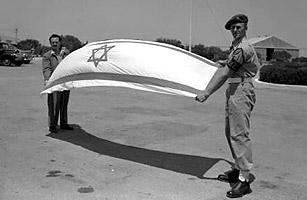
Held by a Haganah military policeman and an unidentified Jewish official, the flag of the newly proclaimed Jewish state of Israel bellies in the breeze before it it hoisted over the Haifa Airport.
May 14, 1948
"What I am trying to do is make the whole world safe for Jews," Harry Truman wrote as he wrestled over the decision to recognize a Jewish state in Palestine. Deeply affected by the Holocaust, Truman sympathized with Jewish aspirations for a homeland. In November 1947 he lobbied for the U.N. resolution that divided Palestine into Jewish and Arab states. Britain announced it would hand authority over Palestine to the U.N. by May 14, 1948. Secretary of State George Marshall advised against recognition, warning Truman that Arab countries would cut off oil and unite to destroy the Jews. On the eve of British withdrawal — to be followed by an immediate Jewish declaration of independence—he told Truman "the great office of the President" was at stake.
But Truman's mind was made up. At 4 p.m., David Ben-Gurion read a 979-word declaration of independence in front of a small audience at the Tel Aviv Art Museum. He finished, "The state of Israel is established! The meeting is ended." At midnight, British rule over Palestine lapsed; 11 minutes later White House spokesman Charlie Ross announced U.S. recognition. "God put you in your mother's womb," the Chief Rabbi of Israel later told Truman, "so you would be the instrument to bring the rebirth of Israel." With Truman's decision, the hopes of the Jewish people were realized, but so too were Marshall's fears. Arab opponents of the new nation immediately declared war, prompting a bloody struggle over Israel's existence that would rage into the next century.